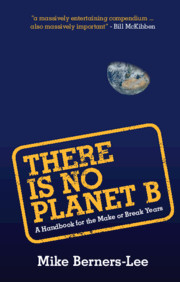
There Is No Planet B
Cambridge University Press (Verlag)
978-1-108-43958-9 (ISBN)
- Titel erscheint in neuer Auflage
- Artikel merken
Feeding the world, climate change, biodiversity, antibiotics, plastics - the list of concerns seems endless. But what is most pressing, what are the knock-on effects of our actions, and what should we do first? Do we all need to become vegetarian? How can we fly in a low-carbon world? Should we frack? How can we take control of technology? Does it all come down to population? And, given the global nature of the challenges we now face, what on Earth can any of us do? Fortunately, Mike Berners-Lee has crunched the numbers and plotted a course of action that is practical and even enjoyable. There is No Planet B maps it out in an accessible and entertaining way, filled with astonishing facts and analysis. For the first time you'll find big-picture perspective on the environmental and economic challenges of the day laid out in one place, and traced through to the underlying roots - questions of how we live and think. This book will shock you, surprise you - and then make you laugh. And you'll find practical and even inspiring ideas for what you can actually do to help humanity thrive on this – our only – planet.
Mike Berners-Lee thinks, writes, researches and consults on sustainability and responses to the challenges of the twenty-first century. He is the founder of Small World Consulting (SWC), an associate company of Lancaster University, which works with organisations from small businesses to the biggest tech giants. SWC is a leader in the field of carbon metrics, targets and actions. His previous books include How Bad Are Bananas?: The Carbon Footprint of Everything (2010) and The Burning Question: We Can't Burn Half the World's Oil, Coal, and Gas. So How Do We Quit? (2013, co-written with Duncan Clark). This book explores the big picture of climate change and the underlying global dynamics, asking what mix of politics, economics, psychology and technology is really required to deal with the problem. Berners-Lee is a professor in the Institute for Social Futures at Lancaster University, where he develops practical tools for thinking about the future, and researches the global food system and carbon metrics.
Acknowledgments; Notes on units; 1. Introduction; 2. Food; 3. More on climate and environment; 4. Energy; 5. Travel and transport; 6. Growth, money and metrics; 7. People and work; 8. Business and technology; 9. Values, truth and trust; 10. Conclusion: thinking skills for today's world; 11. Big picture summary; 12. What can I do? Summary; Appendix: climate change basics; Alphabetical quick tour; Endnotes; Index.
| Erscheinungsdatum | 02.02.2019 |
|---|---|
| Zusatzinfo | Worked examples or Exercises; 2 Tables, black and white; 4 Maps; 31 Halftones, black and white; 7 Line drawings, black and white |
| Verlagsort | Cambridge |
| Sprache | englisch |
| Maße | 138 x 216 mm |
| Gewicht | 380 g |
| Themenwelt | Sachbuch/Ratgeber ► Natur / Technik |
| Naturwissenschaften ► Biologie ► Ökologie / Naturschutz | |
| Technik ► Umwelttechnik / Biotechnologie | |
| ISBN-10 | 1-108-43958-6 / 1108439586 |
| ISBN-13 | 978-1-108-43958-9 / 9781108439589 |
| Zustand | Neuware |
| Informationen gemäß Produktsicherheitsverordnung (GPSR) | |
| Haben Sie eine Frage zum Produkt? |
aus dem Bereich



